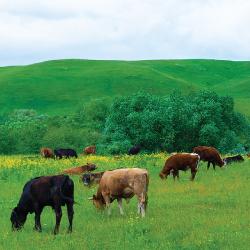Defending Beef: The Ecological and Nutritional Case for Meat by Nicolette Hahn Niman, is definitely not on the recommended summer reading list for Bill Gates and the other Silicon Valley tycoons who are bankrolling genetically engineered lab meat and animal products.
These GMO enthusiasts tell us that organic agriculture and livestock management are a threat to the environment, drivers of climate change, and an impediment to solving world hunger. From their mansions and boardrooms, they tell us that the billion indigenous and small farm ranchers should just give up on animal husbandry, switch to GMO Impossible Burgers and vegan fare, and perhaps “find another job.”
Before I learned about the environmental, climate, and nutritional benefits of regenerative grazing, I was a committed vegetarian for over three decades. Like most Organic Bytes subscribers, I abhor factory farms and the network of millions of acres of GMO soybeans and corn and government subsidies that prop up this abomination. I boycott factory-farmed “Big Meat and Dairy.” I’m the co-founder and manager of an organic research farm in Mexico, Via Organica, that raises and nurtures a diversity of farm animals in a humane and regenerative manner.
And as renowned animal welfare advocate Temple Grandin reminds us:
“I have traveled to every state in the U.S. during both summer and winter and have seen the land in extensive rural areas. There are huge land areas in this country that cannot be used for crops. The only way to grow food on these lands is by grazing animals. Grazing done properly will improve the land. Defending Beef shows clearly that beef cattle are an important part of sustainable agriculture.”

